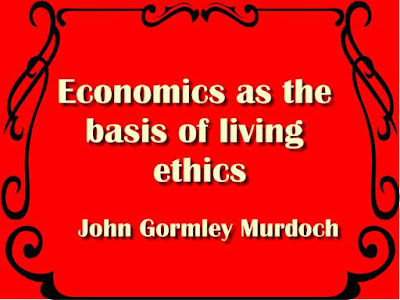Economics as the basis of living ethics Economics as the basis of living ethics a study in scientific social philosophy From the preface: T...
Economics as the basis of living ethics
a study in scientific social philosophy
From the preface:
This book contains the writer's attempt to answer some of the questions which insistently forced themselves upon him A number of his friends found some value for themselves in what he had written.
He himself assured that there were many others who were putting like questions in a like sceptical attitude, easily made himself believe that these pages might be of aid somewhere, even if they express no more than a kind of sympathy.
Hence in part, the publication of this book. The chapters were originally prepared, and in part de- livered, as lectures to " The People's Forums " of Troy, N. Y., and Schenectady, N. Y. The)'- form a continuous discussion of the dependence of ethics upon economics from the viewpoint of Marx's conception of history.
First comes the Marxian idea; next, its application to theories of property and ethics; the ethics of profit and interest lead to criticism of the modern economic theory, first on the side of production. Prof. Clark is taken as typical; next, on the side of ex- change, psychological economics is shown to be largely circular; economics are sought in Kant as typical of the absolute moralists; finally, a somewhat wider discussion of ethics and economic determinism, touching also on other outputs of human consciousness.
Social unrest exists throughout the civilized world; the demand for " social justice " becomes insistent; ancient ideals are crumbling; political parties are disintegrated; old-line leaders are nonplussed; arguments fill the air; the soap box has sounding boards as well as the pulpit and the rostrum; there is great mental confusion.
Much of this confusion arises from the fact that the contestants occupy different grounds and wield different weapons. Some will have only statistical facts, history, and positive knowledge; others know only ideals, abstract principles, ethical and religious beliefs, and" the teachings of the fathers." Typically, ethics and economics are pitted against each other. The following articles attempt to introduce a principle of order into this confusion. The lectures and essays assume that the reader will take the positivist attitude.
The concrete facts of anthropology, psychology, sociology, biology, and history, in short, the subject- a matter of modern science, must control all theories. Any metaphysical or theological principle or dogma is usually pure surplusage when in the presence of the facts themselves; such principles and dogmas are reflections, they are not original data. Any reader unable or unwilling to adopt this attitude, at least for the time being, may as well lay this book aside at this very instant.
The critical judgments pronounced are intended to be without personal rancour. The writer himself has lived too long amid illusions and through some of them not to know, at least faintly, how deeply they penetrate and unconsciously mould beliefs and practices. Contradictions not less easily than mere incongruities dwell contentedly side by side in even a great man's mind. Pride married to humility knows other homes than the bosom of the Puritan.
If to the reader the writer seems at times somewhat too " holy," let the reader examine first his own stock of illusions, then look again, or at least believe, ' it was not so intended '; the criticisms are meant to be strictly objective. Pronouncing judgment ac- cording to simple tests is not arrogating superiority, least of all, moral superiority.
The writer can not himself tell all the sources of his material. Occasionally acknowledgement is made, but he has not taken the trouble to mark many of the sources; his desire is that the conclusions rest, not upon " authorities," but upon the reasoning.
He claims no originality; he has plundered wherever he found anything he thought available; if from the dead, then no acknowledgement is needed — we are all heirs of the past ages '; if from the living, and any one of these feel him- vii self aggrieved, then if he will securely identify his private " original " property, the writer will gladly make what reparation he can; — otherwise, the claimant is probably a fellow- plunderer in respect to this also.
Some contents:
I. THE ECONOMIC INTERPRETATION OF HISTORY. 1
Content and extent of historical records, 1. — Theories of his- tory, 3. — Economic interpretation of history, 10. — Illustration, American history, 14. — Ethical illustration, slavery, 18. — Economic determinism and socialism, 19. — Economic de- terminism is not the narrow economic, 21
II. ETHICS AND THEORIES OF PROPERTY.
.. 24 Social unrest and property, 24. — Theories of property, 25. — Critical principles must be scientific, 29. — The divine sanction is unscientific, 31. — "Intuition" is useless, 35. — Ultra-individualism is self-contradictory, 41. — Egoism and altruism, 47. — Class struggle and class consciousness, 48.
Ill ETHICS AND PRODUCTIVITY THEORIES OF INTERESTS/
Seeming sterility of ethical systems, 57. — Clark's ethical problem, 60. — Clark's economic problem and solution, 64. — Confusions on the economic field, 74. — Confusion of ethical tests, 99. — "Institutional robbery" and interest, 107. — Ethical purification by "functional distribution," 123. — Clark's ethics relative and transitory, 130.
The book details : Author: John Gormley Murdoch Publication date:1912 Company: Troy, N.Y.: Allen Book and Printing Co.










